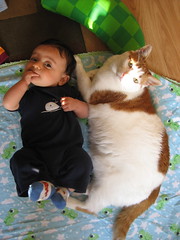And baby and kitty make three. The truth about toxoplasmosis in cats and pregnancy.
 Today I read another story about a women thinking of giving up her cat because she was pregnant. It makes me so sad then our loyal companions are thrown away especially when there are many ways to have a safe pregnancy and keep the cat.
Today I read another story about a women thinking of giving up her cat because she was pregnant. It makes me so sad then our loyal companions are thrown away especially when there are many ways to have a safe pregnancy and keep the cat.
Please read this before considering giving up your furry friend just because you are pregnant and worried about toxoplasmosis.
We have all hear about the risk from toxoplasmosis to unborn fetuses and that pregnant woman should not get near cat boxes. But from there the facts often morph into fiction until suddenly pet cats are praying on your unborn baby’s soul and women are running to the shelter to turn in their fuzzy friends.
So here are the facts! I am not a MD so please bring this sheet to your doctor to discuss.
1. The number one way to catch toxoplasmosis is from eating undercooked meat (beef, lamb or pork). That’s right, if you eat your steak cooked anyway other then well done, that is the most common way of getting toxoplasmosis. It’s the cows, not the cats really! At least 60% of toxoplasmosis infections occur this way.
2. About 11% of adults in the United States are seropositive for toxoplasmosis. In other words, they have already had it. In immunocompetant folks once you get it that’s it. You can’t get it twice. In other words 11% of the US population does not have to worry about catching toxoplasmosis. As a pregnant woman you can have a blood titer for toxoplasmosis run and interpreted by your doctor. If it shows you have been infected you do not have to worry about catching toxoplasmosis while you are pregnant.
3. 40% of AIDS patients have what is called cerebral toxoplasmosis (toxoplasmosis of the brain). But guess what, those HIV positive people with cats do not have a higher rate of toxoplasmosis. In fact, overall HIV positive people with animals have a lower overall rate of zoonotic disease (diseases that can be caught from animals). People living with cats do not have a higher rate of toxoplasmosis.

4. Cats get toxoplasmosis from eating rodents or rabbits. Once they have it they can pass it to people for 2-3 weeks. After they have it once that’s it, they do not get it again. So your cat can only potentially be contagious to you for 2-3 weeks out of his/her life.
5. Toxoplasmosis cysts are passed in the feces of cats. The feces need to be outside of the cat for 24 hours because the cysts are infectious. Only after that can they be passed to a person and only if feces is eaten or put in the mouth.
6. Toxoplasmosis can also be caught while gardening because cats poop in gardens. Use caution if you are pregnant and gardening just like you would around the cat box.
So what should you do if you are pregnant? Because toxoplasmosis is a very serious problem to fetal babies, this is a very important concern. There are many ways to be protected and keep your cat.
1. Consider getting a titer done for toxoplasmosis through your doctor especially if you have cats or work with animals. If your titer is positive then you don’t have to worry. I got in trouble for pointing this out in my childbirth classes as most of the women in the class with cats had already convinced their husbands to take over cat box duty.

2. Consider keeping your cat inside to reduce their exposure to rabbits and rodents they can catch.
3. Do not eat meat unless it is well cooked!!! Use caution in handling raw meat.
4. Do not garden without gloves and make sure to wash your hands well afterwards. Do not touch your mouth or face while gardening.
5. Unless you have a positive titer for toxoplasmosis, have someone else clean the litter box if possible. If you have to clean the litter box make sure you wash your hands well afterward and do not touch your face while cleaning it. Clean the litter box at least every 24 hours to avoid having the cysts become infectious.
Here is another good article on toxoplasmosis transmission, Take These Precautions to Prevent Toxoplasmosis During Pregnancy.
Please pass this on to your friends and family and as always I am happy to answer any questions.
Tags: cat, toxoplasmosis
This entry was posted
on Tuesday, September 22nd, 2009 at 12:32 pm and is filed under health.
You can follow any responses to this entry through the RSS 2.0 feed.
Both comments and pings are currently closed.
 Today I read another story about a women thinking of giving up her cat because she was pregnant. It makes me so sad then our loyal companions are thrown away especially when there are many ways to have a safe pregnancy and keep the cat.
Today I read another story about a women thinking of giving up her cat because she was pregnant. It makes me so sad then our loyal companions are thrown away especially when there are many ways to have a safe pregnancy and keep the cat.


October 6th, 2009 at 11:51 am
Great post on a common occurance – giving up cats when women get pregnant!